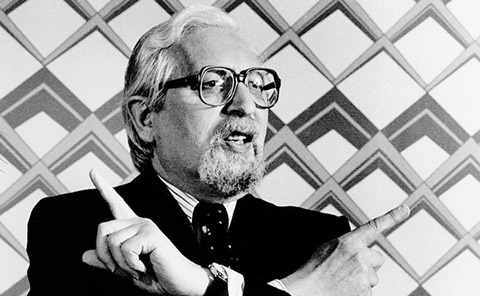My grandfather, and self-appointed family patriarch, Sol Littman died earlier this year at age 96.
When I was young, he was the loving man who taught me to play table tennis and golf, and engaged me in achingly slow games of chess via email, both of us with boards set up next to our computers. It wasn’t until I was in my teens – and he was in his 80s – that I came to understand he was internationally renowned for hunting Nazi war criminals, and had dedicated his life to social justice and anti-discrimination.
The son of poor Jews from Poland and Lithuania, Sol grew up in Toronto’s Kensington Market and paid his way through U of T by working at Tip Top Tailors. He earned a BA from University College in 1945, followed by a degree in social work in 1953.
He chose his career so he could help address the poverty and the systemic anti-Semitism he, his family and the Jewish community experienced in Toronto in his youth. He was also motivated by Canada’s discriminatory – and ultimately tragic – restrictions on Jewish immigrants between 1933 and 1945.
In the ’50s and ’60s, he worked for the Anti-Defamation League in New York, Omaha and Detroit. He returned to Canada in 1968, and headed B’nai Brith’s League of Human Rights, which successfully pressured Toronto’s Granite Club to abandon its anti-Semitic membership practices.
In 1971 he turned to journalism: he edited the Canadian Jewish News, became community relations editor at the Toronto Star and reported for the CBC, producing features such as his 1974 award-winning investigation into Canada’s dreadful prison conditions.
Sol’s 1983 book, War Criminal On Trial, was based on his reporting of the arrest, extradition and trial of Helmut Rauca, a Nazi war criminal who spent 30 years undetected in Canada. The book ruffled feathers over the questions it raised about Canada’s commitment to bringing Rauca to justice. But it was Sol’s 14 years as Canadian representative of the Simon Wiesenthal Center – whose mandate was to track down Nazi war criminals – that caused controversy. The centre’s campaign to get the Canadian government to act against named alleged war criminals led Prime Minister Brian Mulroney in 1985 to appoint the Deschênes Commission of Inquiry into war criminals in Canada, to which Sol contributed evidence.
But, dissatisfied with the commission’s findings and undeterred by fierce criticism from some quarters about his evidence and motives, Sol spent 12 years researching his book Pure Soldiers or Sinister Legion (2003). The book questioned the wartime role of the German-recruited Ukrainian Waffen-SS division, suggesting that it was not the benign force as had been claimed but instead had committed war crimes (though Sol was extremely careful not to accuse every division member of crimes).
Sol also shed light on Canada’s compliance with the British government’s desire to “export” this division and other alleged war criminals throughout the Commonwealth between 1950 and 1955. The history and issues raised by the book are still hotly disputed.
He continued writing and teaching until shortly before he died. Sol inspired me to attend U of T, and taught me that growing older does not inherently make one more conservative. The anti-Semitism, racism and nationalism Sol fought against are resurgent, but today’s vitriol is also directed at other scapegoats. His work is a reminder for us to be vigilant and not let history be repeated.
Sol’s old friend Sam Sniderman once told me that my great-grandmother had warned Sol to study hard or he would “end up a bum like that Sam Sniderman.” Sam, also formerly of Kensington Market, became the music industry legend Sam the Record Man and was awarded the Order of Canada in 1976. Such bums he and Sol were!





